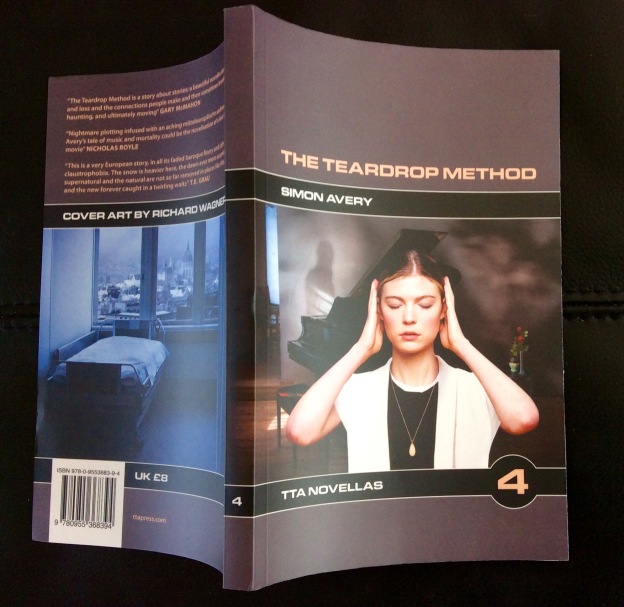The Teardrop Method – Simon Avery

I had my ears syringed today and later received this book.
My previous reviews of TTA Press publications HERE and Simon Avery works HERE.
When I review this novella, my thoughts will appear in the comments stream below… (My reviewing queue of purchased publications is growing longer and I don’t expect to catch up until late October).

1 & 2
“She tried to imagine how she could ingratiate herself into his life in order to pursue the song to its bitter end.”
An absolutely miraculous start to this novella, a book that I intend to take slowly, eke out, ache out, even, act out. The snowy benighted ambiance of Budapest as Krisztina of apparent Sapphic leanings seeks a song, here with a literally accidental (road accident to other people) meeting of an older man – a soldier from the invasion of Czechoslovakia in 1958 (is this an alternate world for 1968?) – whose clumsy if partially permitted sex upon her in his flat evolves partial discovery of a song that she sought, still seeks. Beautifully done. I am utterly captivated.
The word ‘ingratiate’ above reminds me that I used it in the last day or so with regard to being drawn into, ingratiated into my coincidentally concurrent real-timing of the mighty novel THE UNCONSOLED here – a kindred-spirited book? Also reminds me that I myself coincidentally wrote yesterday a very brief, possibly kindred-spirited prose poem here.
“She waited for hours with her hands suspended above the piano but the melody resisted her. She was afraid of one false note.”
…as a writer of fiction must feel, except typewriters once made that a fear of indelibility. The nearer to truth the writer today reaches within the flow of less indelibility, the nearer that false note promises to take it beyond perfectible fiction. Here, amid the romantic pangs of Pest and Buda, such songs, towards each of which Krisztina reaches, contain more than just a false impending note but also life’s own dreadful last indelible note that ignites them. One song derives from another road accident. Each song a gathering gestalt of piecemeal verse and music by dint of any such keynote’s induced crystallisation of weeping… Dave Cook’s copy, a music review, tells us inadvertently that her surname is Ligeti.
But if you go from Moscow to Budapest you think you are in Paris. — György Ligeti
“But some of the words had been gestating for years, you know? I was just waiting for them to make sense to me.”
Dave Cook reveals inadvertently — in another article, i.e. an interview with her father the same age as me — more about K and her real surname probably not being Ligeti, but only her stage name, I guess. There is also another aspect (concerning porcelain) that I keep forgetting to mention, but now remembered, but still undivulged in my own review, or article, that you are reading now. And exactly how K’s songs gestate as songs, as gestalts. These are things for readers themselves to listen out for. Suffice to say, K’s reunion meeting with her terminally ill father is moving and meaningful in this context that I have not divulged.
In recent months, I have myself discovered the music of Scott Walker, and as a classical music lover, this has been a revelation. The description of the music of K’s father has beautifully captured Scott Walker’s songs for me, and this may also give me greater understanding of K’s songs. The mention of Sibelius is significant, too, bearing in mind his great music and also his not composing any of it in the last 32 years of his life.
“Every person on every street is a potential tale to tell.”
The crossing paths of mortality and music. And literature. As we become imbued with the historical hinterland of Budapest, occupied, like Paris once was, but here occupied with the stories of people, but unlocked, unoccupied how? Some haunting others, some captured by others, and we truly empathise with the musical stalking, the literary stalking, too. Like finality-clinching vampires. Our real-time live performance this as a gestalt review, like K’s performing her songs live for the first time and with her father present, and the deadly stalking by some sort of King in Yellow? Or by “the author and the broken model.” Staring into the Danube, somehow ‘thrilling’ as well as ‘depressing.’ Full of teardrops?
Pages 92 – 111




“…the song had followed her from the dream. It had escaped into the dark rooms;”
…and also into lighter ones, towards a sound-chiaroscuro of art helping art, death helping art, too, and vice versa, as we all do in our creative world that I map out on my site, I hope. I am pleased that my chance instinctive quote earlier from Ligeti prefigured the later importance of Paris in this monumentally haunting novella, as well as of Budapest, not only the road accident in Paris, this book’s accident and a different one there, but K’s eventual home city, where her second Sapphic love to replace the first also enhances that death- and art-synergistic mapping I mention above. The father-daughter synergy, too. Walker with no stalker left. A Yellow King, a Yellow Jack. A new song. A new dream. After horror’s nightmare. A song for a song. A knife from ear to ear? Thanks, Dave Cook, for your review of ‘The Teardrop Method.’
A novelette by Simon Avery entitled GOING BACK TO THE WORLD that I reviewed when it first appeared in Black Static #44 here: https://dflewisreviews.wordpress.com/2015/01/22/black-static-44/#comment-3854